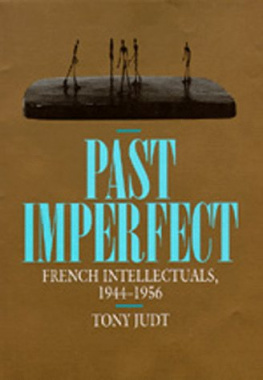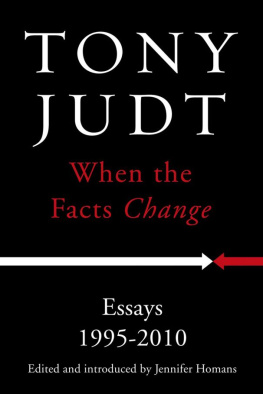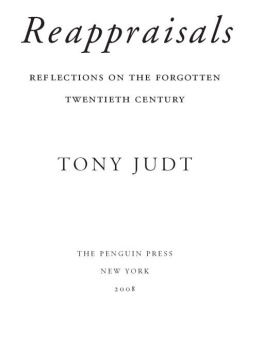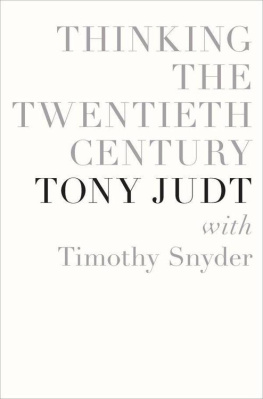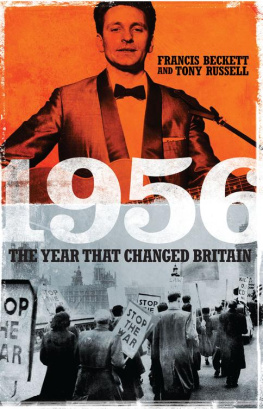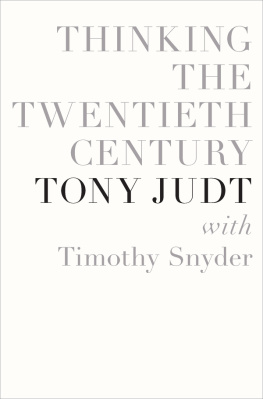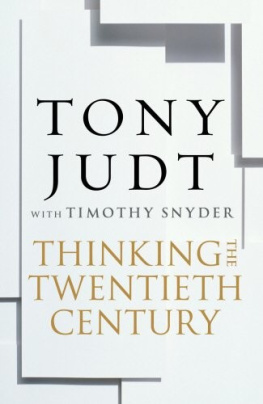Tony Judt - Past Imperfect - French Intellectuals, 1944 - 1956
Here you can read online Tony Judt - Past Imperfect - French Intellectuals, 1944 - 1956 full text of the book (entire story) in english for free. Download pdf and epub, get meaning, cover and reviews about this ebook. year: 0, genre: Politics. Description of the work, (preface) as well as reviews are available. Best literature library LitArk.com created for fans of good reading and offers a wide selection of genres:
Romance novel
Science fiction
Adventure
Detective
Science
History
Home and family
Prose
Art
Politics
Computer
Non-fiction
Religion
Business
Children
Humor
Choose a favorite category and find really read worthwhile books. Enjoy immersion in the world of imagination, feel the emotions of the characters or learn something new for yourself, make an fascinating discovery.
Past Imperfect - French Intellectuals, 1944 - 1956: summary, description and annotation
We offer to read an annotation, description, summary or preface (depends on what the author of the book "Past Imperfect - French Intellectuals, 1944 - 1956" wrote himself). If you haven't found the necessary information about the book — write in the comments, we will try to find it.
Past Imperfect - French Intellectuals, 1944 - 1956 — read online for free the complete book (whole text) full work
Below is the text of the book, divided by pages. System saving the place of the last page read, allows you to conveniently read the book "Past Imperfect - French Intellectuals, 1944 - 1956" online for free, without having to search again every time where you left off. Put a bookmark, and you can go to the page where you finished reading at any time.
Font size:
Interval:
Bookmark:

Past Imperfect
Past Imperfect
French Intellectuals, 19441956
Tony Judt
UNIVERSITY OF CALIFORNIA PRESS
Berkeley / Los Angeles / Oxford
Toute ide fausse finit dans le sang, mais il s'agit toujours du sang des autres. Cest ce qui explique que certains de nos philosophes se sentent laise pour dire n'importe quoi.
Mistaken ideas always end in bloodshed, but in every case it is someone elses blood. That is why some of our thinkers feel free to say just about anything.
Albert Camus
Originally published as Pass imparfait; Les Intellectuels en France, 1944-1956.
@ 1992 by Librairie Arthme Fayard, Paris.
University of California Press
Berkeley and Los Angeles, California
University of California Press, Ltd.
Oxford, England
1992 by
The Regents of the University Of California
Library of Congress Cataloging-in-Publication Data
Judt, Tony.
Past imperfect: French intellectuals, 19441956 / Tony Judt.
p. cm.
Includes bibliographical references and index.
ISBN ()-5W079214 (cloth dk. paper)
I. Franceintellectual life 20 th century. 2. Intellectuals France - Political and social views History 20 th century.
3. Communism and intellectuals France History th century. I. Title.
DC33.7.J84 1992
944.082dc20 91-42870
CIP
Printed in the United States of America
987654321
The paper used in this publication meets the minimum requirements of American National Standard for Information SciencesPermanencc ofPapcr for Printed Library Materials. ANSI 7-39.48-1984.
Contents
This book was written while I was on leave in Stanford, California, as the guest of the Hoover Institution. I would like to offer my thanks to the director and fellows of that in Institution for their generous support and for access to their unrivaled library and archive holdings. My stay in Stanford was made possible by a fellowship from the John Simon Guggenheim Foundation. Research and reading at an earlier stage were conducted with the support of fellowships from the Nuffield Foundation and the Humanities Center of Stanford University. To all of these, and to New York University for granting me a leave of absence during the year 1990, my most grateful thanks and appreciation.
Some of the arguments developed in this book were presented as lectures, seminar papers, or articles in the course of recent years. They have thus benefitcd from the comments of many friends and colleagucs, and it is a pleasurc to acknowledge these contributions, too many to list in full. Helen Solanum read the whole typescripttwice! Her help and support have been invaluable.
I should also like to express my appreciation for the lively and intense discussions of some of the themes of this book that took place in my graduate seminar in New York, and for similarly provocative exchanges in Jacques Rupnik's seminar at the cole des Hautes tudes en Sciences Sociales, whose guest I was in the spring of 1989. Not the least interesting lesson of these experiences has been the marked difference in the way in which French and American graduate students approach problems of intellectual It is a pleasure to be able to report that there IS much to be said for both cultural styles.
Finally, my thanks to my editor, Sheila Levine, for her enthusiastic support for this book. With her encouragement I have tried to adapt for a broader audience a text originally aimed at French readers. This has entailed some clarification of otherwise obscure references, an exercise from which the book as a whole has, I hope, benefited.
For a period of about twelve years following the liberation of France in 1944, a generation of French intellectuals, writers, and artists was swept into the vortex of communism. By this I do not mean that they became Communists; most did not, Indeed, then as now, many prominent intellectuals in France had no formal political affiliation, and some of the most important among them were decidedly non-Marxist (Raymond Aron is only the best-known example among many). But the issue of communismits practice, its meaning, its claims upon the future dominated political and philosophical conversation in postwar France. The terms of public discussion were shaped by the position one adopted on the behavior of foreign and domestic Communists, and most of the problems of contemporary France were analyzed in terms of a political or ethical position taken with half an eye towards that of the Communists and their ideology.
This situation was not wholly unprecedented. During the thirties similar concerns had colored the stance of French intellectuals, and they would continue to do so, for some at least, until the early seventies. But the years 194456 were different, The Vichy interlude had served to delegitimize the intellectuals of the Right (who had played an important part in French cultural life between the wars), while the experience of war and resistance had radicalized the language, if not the practices, of the Left. The period after 1956 saw a progressive shift away from the concern with domestic and European radicalism, brought on by the emergence of anticolonial movements in the non-European world and the doubts and disillusion precipitated by Khrushchev's speech of February 1956, in which the leader of the Communist world attacked the crimes and failings of the Stalin era. The decade following World War Il was thus unique in the near-monopoly exercised by the appeal of Soviet communism within the Left, in the importance of that appeal for a majority of French political thinkers, and in the enthusiasm with which the case for communism was defended.
Moreover, it was precisely in this decade that Soviet society expanded from its earlier containment within the frontiers of a distant and alien Russia and established itself in the territory formerly known as Central Europe. Where Lenin's revolution and its Stalinist unfolding could once be treated as something peculiar to a distant land, the experience of the Peoples Democracies brought communism literally closer to home. The postwar establishment of totalitarian government in Budapest, Warsaw, Berlin, and Prague, with its attendant repression, persecution, and social upheaval, placed the moral dilemma of Marxist practice at the center of the Western intellectual agenda. The interwar sufferings of Stalin's victims in collectivization, political purges, and mass population transfer could if necessary be ascribed to the trauma of modernization and revolution in a backward, historically barbaric society. The same could not be said in the ease of Stalinism in Central Europe after the war, and apologias for communism, and by extension for Marxism as a doctrine of human liberation, were accordingly compelled to acknowledge and explain the immense human sacrifices now being exacted in the name of History and Freedom.
This book is about those apologias and their accompanying theorems, and about the men and women who espoused them in the years 1944 56. It is not a study of Communist intellectuals nor, except in passing, is it about the words and deeds of Communists. Its protagonists are those French intellectuals, some prominent, some obscure, some Communists, most not; who sought to themselves on the side of Progress at a time when that engagement exacted a heavy moral toll. From the privileged perspective of the last years of our century, the response of French intellectuals to these matters, the way in which they described their political and moral commitments, and the terms in which they explained and justified the practice of contemporary Stalinism seem strange and distant, echoes of a political and cultural universe from which we are now far, far removed,
Next pageFont size:
Interval:
Bookmark:
Similar books «Past Imperfect - French Intellectuals, 1944 - 1956»
Look at similar books to Past Imperfect - French Intellectuals, 1944 - 1956. We have selected literature similar in name and meaning in the hope of providing readers with more options to find new, interesting, not yet read works.
Discussion, reviews of the book Past Imperfect - French Intellectuals, 1944 - 1956 and just readers' own opinions. Leave your comments, write what you think about the work, its meaning or the main characters. Specify what exactly you liked and what you didn't like, and why you think so.

